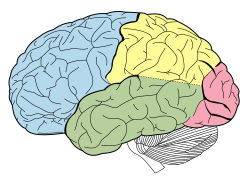Cognitive reserve
The brain's ability to resist damage or decline through compensatory mechanisms
Cognitive reserve is the concept that refers to the brain's resilience or adaptability in coping with damage or decline. It describes how individuals with similar levels of neuropathology may show different levels of cognitive function, depending on factors such as education, occupation, or engagement in intellectually stimulating activities.
The mind’s capacity to withstand pathological damage is evaluated through behavioral and neuropsychological measures, while structural or cellular damage in the brain is evaluated using histological analysis. In modern research, neuropathological damage may also be estimated non-invasively using neuroimaging techniques and blood-based biomarkers.
Models of Reserve[edit]
There are two major theoretical models used to understand the concept of reserve in neuroscience:
Brain Reserve[edit]
Brain reserve refers to a passive model in which individual differences in the structural capacity of the brain — such as brain volume, neuron count, or synaptic density — determine how well a person can tolerate damage before clinical symptoms appear. People with greater brain reserve may sustain more physical damage to the brain before showing symptoms of cognitive decline. This model is based on anatomical and quantitative thresholds.
Key factors influencing brain reserve include:
Cognitive Reserve[edit]
Cognitive reserve is an active model that describes the brain's ability to utilize existing cognitive processes or recruit alternative neural networks to compensate for brain damage or age-related changes. This model accounts for why individuals with similar levels of brain pathology (such as that seen in Alzheimer's disease) can present with different cognitive outcomes.
Factors thought to enhance cognitive reserve include:
- Higher levels of education
- Lifelong learning
- Mentally stimulating occupations
- Active social engagement
- Bilingualism
- Participation in physical exercise and cognitively enriching activities
Measurement and Evaluation[edit]
Cognitive reserve is not directly measurable but is often inferred using:
- Behavioral assessments and cognitive testing
- Functional MRI and PET scan studies of brain activity
- Structural imaging (e.g., MRI) to assess brain atrophy
- Biomarkers indicating neurodegeneration
Researchers often compare individuals’ cognitive performance to their expected levels based on brain pathology to estimate the presence of cognitive reserve.
Role in Neurological Disease[edit]
Cognitive reserve plays a significant role in modulating the impact of neurodegenerative diseases and other brain injuries. In diseases like:
Individuals with higher cognitive reserve may demonstrate fewer symptoms or slower cognitive decline despite similar levels of disease burden.
Enhancing Cognitive Reserve[edit]
Although cognitive reserve is partly determined by genetics and early-life experiences, there is evidence that it can be increased or maintained throughout life by:
- Engaging in lifelong learning and complex cognitive tasks
- Maintaining social connections
- Pursuing intellectually demanding jobs or hobbies
- Regular aerobic and resistance exercise
- Managing cardiovascular and metabolic health
See Also[edit]
- Neuroplasticity
- Cognitive aging
- Neurodegeneration
- Alzheimer's disease
- Mental stimulation
- Learning
- Education
- Dementia
| Neuropsychology |
|---|
|
|
| Cognitive science | ||||||||
|---|---|---|---|---|---|---|---|---|
This Cognitive science related article is a stub.
|
Ad. Transform your life with W8MD's Budget GLP-1 injections from $75


W8MD offers a medical weight loss program to lose weight in Philadelphia. Our physician-supervised medical weight loss provides:
- Weight loss injections in NYC (generic and brand names):
- Zepbound / Mounjaro, Wegovy / Ozempic, Saxenda
- Most insurances accepted or discounted self-pay rates. We will obtain insurance prior authorizations if needed.
- Generic GLP1 weight loss injections from $75 for the starting dose.
- Also offer prescription weight loss medications including Phentermine, Qsymia, Diethylpropion, Contrave etc.
NYC weight loss doctor appointmentsNYC weight loss doctor appointments
Start your NYC weight loss journey today at our NYC medical weight loss and Philadelphia medical weight loss clinics.
- Call 718-946-5500 to lose weight in NYC or for medical weight loss in Philadelphia 215-676-2334.
- Tags:NYC medical weight loss, Philadelphia lose weight Zepbound NYC, Budget GLP1 weight loss injections, Wegovy Philadelphia, Wegovy NYC, Philadelphia medical weight loss, Brookly weight loss and Wegovy NYC
|
WikiMD's Wellness Encyclopedia |
| Let Food Be Thy Medicine Medicine Thy Food - Hippocrates |
Medical Disclaimer: WikiMD is not a substitute for professional medical advice. The information on WikiMD is provided as an information resource only, may be incorrect, outdated or misleading, and is not to be used or relied on for any diagnostic or treatment purposes. Please consult your health care provider before making any healthcare decisions or for guidance about a specific medical condition. WikiMD expressly disclaims responsibility, and shall have no liability, for any damages, loss, injury, or liability whatsoever suffered as a result of your reliance on the information contained in this site. By visiting this site you agree to the foregoing terms and conditions, which may from time to time be changed or supplemented by WikiMD. If you do not agree to the foregoing terms and conditions, you should not enter or use this site. See full disclaimer.
Credits:Most images are courtesy of Wikimedia commons, and templates, categories Wikipedia, licensed under CC BY SA or similar.
Translate this page: - East Asian
中文,
日本,
한국어,
South Asian
हिन्दी,
தமிழ்,
తెలుగు,
Urdu,
ಕನ್ನಡ,
Southeast Asian
Indonesian,
Vietnamese,
Thai,
မြန်မာဘာသာ,
বাংলা
European
español,
Deutsch,
français,
Greek,
português do Brasil,
polski,
română,
русский,
Nederlands,
norsk,
svenska,
suomi,
Italian
Middle Eastern & African
عربى,
Turkish,
Persian,
Hebrew,
Afrikaans,
isiZulu,
Kiswahili,
Other
Bulgarian,
Hungarian,
Czech,
Swedish,
മലയാളം,
मराठी,
ਪੰਜਾਬੀ,
ગુજરાતી,
Portuguese,
Ukrainian



